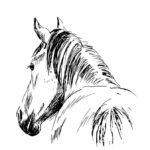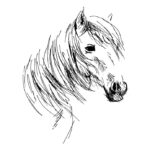EBA
WebinarsEQUINE BEHAVIOUR AFFILIATION
Beyond Behaviourism Webinar Series
The next webinar will be 8th September 2025. For information about this webinar, and to book a place
Click here
Previous EBA ‘Beyond Behaviourism’ Webinars are available to view for £15 for non-members.
Become a member by joining EBA and get access up to 4 free webinars a year, choosing either live attendance or watching past webinars from our library.
Find out more
Webinars
A selection of clips from past webinars can be viewed here
Past webinars are as follows; if you would like more details on any of these, please let us know by contacting: secretary@equinebehaviouraffiliation.org
1. Dr Marie-Louise Holmes: A horse owner’s guide to the brain.
Clinical psychologist and EBA special advisor Dr Marie-Louise Holmes presents a simple model for understanding your horse’s brain. This helps us to understand the importance of addressing emotions, reducing stress and encouraging healthy brain function as key to working ethically and effectively with unwanted behaviours.
2. Sharon Smith Msc: Feeding, behaviour and weight management.
How do different feeds impact on the immediate physical and mental state of horses? What are the implications of too much or too little bodyfat? How can we feed each horse to balance mental and physical well-being? This webinar helps you focus on the individual and not on systems.
Sharon Smith holds an MSc in Applied Equine Science and specialised in grazing behaviour and nutrition.
3. Felicity George: 3 horses who spooked and spun for home…a BioPsychoSocial approach to behaviour problems.
This webinar explains about why EBA Registered Equine Psychology Specialists go ‘beyond behaviourism’ and what that means. 3 examples of horses who ‘spooked and spun’ for very different reasons are given to illustrate the process.
Most unwanted behaviours can happen for so many different reasons, and we need to consider the whole picture to understand and help. Often, they are inappropriately viewed as ‘training problems’ and it can be frustrating and frightening searching for the right training solution when a different kind of help is needed.
4. Dr Marie-Louise Holmes and Felicity George: Trauma in the context of trans-species psychology.
In our fourth beyond behaviourism webinar we will be exploring the parallels between human and animal treatment of psychological trauma presentations with specific examples and a clear link to the principles underpinning the field of trans-species psychology
There will be a strictly limited number of places every year, to ensure that students get the support and time they need from EBA.
5. Dr Andrew Hemmings. Training the brain: A headfirst journey into the neuroscience of learning
Some topics discussed:
* Why horse keepers must get to grips with dopamine
* New data on the genetics of impulsivity and compulsivity
* Dopamine as the driver of training-linked neuroplasticity
* Stress as the confounder of a happy and fulfilled training regime
* Behavioural measures of brain function- how can these measures inform training?
Plus much more !
6. Dr Marie-Louise Holmes and Felicity George: The Secure Base: Attachment, attunement and equine relationships.
Looking at attachment theory, and its practical application to all equine relationships (with humans as well as other horses).
7. Hannah MacIntosh: Working with Clients: Beyond the Behaviour Modification Programme
Exploring some of the key principles that underpin effective communication in a wide range of settings.
Setting the 3 core conditions of a person centred model at the heart of good practice, we will be looking at a range of topics including –
* Practising and reflecting on active listening
* psychoeducation
* understanding ‘readiness’
* modelling
* socratic dialogue
* experiential learning
8. Jane and stuart Myers: Why the Long Face? How horse behaviour, welfare and land management are inextricably linked
Focussing on the behaviour and welfare aspects of land management and paddock layout/use for horses.
Stuart and Jane Myers MSc (Equine) are specialists in making small plots of land work for the environment, owners and property value, as well as the horses, in environmentally sensitive habitats in Australia, USA, Europe and the U.K. Over the last 20 years they have helped hundreds of owners have an easier life and happier horses.
9. Gillian Higgins: Healthy movement and behaviour
Gillian Higgins of ‘Horses Inside Out’ answers questions posed by EBA members about healthy movement and behaviour. From what you can tell about how a horse gets up after sleeping, to the individual nature of the ideal height at which hay should be eaten, to the causes of the most common physical problems seen in the ridden horse, to beneficial exercises for the older horse – a wealth of useful information, with many video clips to illustrate.
10. Jonathan Nunn FWCF: A Balanced View to barefoot vs Shod
With over 37 years of farriery experience, Jonathan Nunn FWCF specialises in veterinary remedial work and performance horses.
Jon is also co-founder and chairman of the Farriers Foundation; a registered charity offering financial support to injured or ill farriers in need.
In this webinar Jon will discuss advantages and disadvantages of keeping a horse barefoot or shod. And how to manage, maintain and improve equine hoof health in a way which benefits each individual horse.
11. Julie Taylor: Picking up where the federations failed
How can we work to protect and improve sport and leisure horse welfare in a world where the sport’s governing bodies have made it clear that they will not?
How can we mobilise legislators and the mainstream media to achieve better horse protection? And dare we even rock that boat?
Former equestrian journalist, current horse advocacy activist and author of the book “I Can’t Watch Anymore” – The Case for Dropping Equestrian From the Olympic Games, Julie Taylor, explains why it’s time to stop pleading with federations like the FEI to protect horses and shift the focus to legislators and mainstream media outlets.
12. Felicity George: 'It Depends' - Equine body language in the real world
Whatever we think we ‘know’ about equine body language, when seeking a deeper understanding of the individual horse in context the only certainty about what we see is ‘it depends’.
13. Felicity George: 100 Equine Behaviour cases: The impact of changes to practice from 2017 to 2022.
In this webinar, we compare understanding of problems, interventions and outcomes for 50 cases in 2017 working as an equine behaviourist and 50 cases in 2022 working as an equine psychology specialist.
Over the past 4 years, the EBA has offered webinars presenting much of the theory behind how Registered Equine Psychology Specialists (REPS) work – attachment theory, understanding trauma and Judith Herman’s Trauma treatment phases and trans-species psychology for example. We have also talked about professional practice – the use of formulation and how we work with clients. This talk links theory to practice.
14. Venya Bonebakker: Change the world, not the horse. A shift in focus - From training systems to systemic problem solving
In this webinar, EBA registered equine psychology specialist Venya Bonebakker will share with you her personal journey, trying to discover how best to help horses with behaviours we find challenging. This involves encounters with different training systems, exploration of theories and practical experiences and experiments. She considers the obstacles presented by social constructs, biases and opinions which held her back from seeing the full picture. A deeper understanding of the factors influencing behaviour, combined with careful listening to horses opinions on ‘what helps’ led to shifts in her priorities and focus.
Many of us embark on such a journey. Each of our journeys is unique, but there is much common ground in what we seek, how we try to find it, and the challenges we face; reflections on one person’s experience can help us all along this path.
15. Karolina westlund: applied ethology for horse guardians
In this webinar, Karolina will discuss:
– what is ethology, and why is it a relevant subject for someone interested in horses?
– basic and applied ethology and the three most important perspectives
– the social environment- epigenetics and weaning
– time budget and foraging
– environmental enrichment for horses- preventing and addressing fear
– the defense cascade, triggers and learning
16. RACHAEL DRAAISMA: SCENTWORK: A TOOL AND MEDICINE FOR THE EQUINE BODY AND SOUL
In this webinar Rachaël Draaisma introduces various forms of equine scentwork. She will dive deeper into the advantages equine scentwork gives and how they positively affect the horses physically and mentally. For instance, you will get to know why scentwork calms the horse, why it leads to less spooky behaviours, or more connection between horse and handler. Rachaël will also discuss the challenges and applicability of various scentwork exercises. Although this webinar does not give a step by step guide on how to get started on the equine scentwork exercises, it will inspire many to explore further and to add these new activities into their daily life and work with horses.
17. Sharon Smith MSC: "A CAKE OF SIMILARITY": Advances in comparative neuroanatomy
19. The Art and Science of Helping Horses
20. Exploring the depths of Equine relationships with Lucy rees
An exciting exploration of the rich lives of feral horses, guided by Lucy Rees—an expert who has spent the past 15 years living with and learning from Pottokas, horses whose way of life has remained nearly untouched by domestication.
You won’t just observe isolated behaviours; you’ll watch stories. You will see how the Pottokas create bonds with family and other horses and how their unique histories shape everyday life choices.
Lucy’s deep, personal understanding of each individual animal transforms raw footage into a rich narrative of ongoing connection, deeper context, and honoured individuality—offering insights that can only come from someone who has truly lived among them.
Whether you’re a seasoned horse enthusiast or simply curious about the natural world, this session is a chance to step into a world of horses that may inspire you to see every horse – also yours – in an entirely new light.
Membership
Join EBA
EBA is committed to supporting members through professional accreditation, education and opportunities for development.
We have 3 levels of Membership:
- Supporter
- EBA Student
- Professional
Visit our Membership Page for details on what each level offers and how to join.

Join as a Supporter
For any individuals who are interested in equine behaviour but who are not practising as an EBA Registered Equine Psychology Specialist.

STUDENT MEMBERSHIP
For anyone currently training with the EBA. You can join EBA as a student by registering and being accepted for any of our courses.
